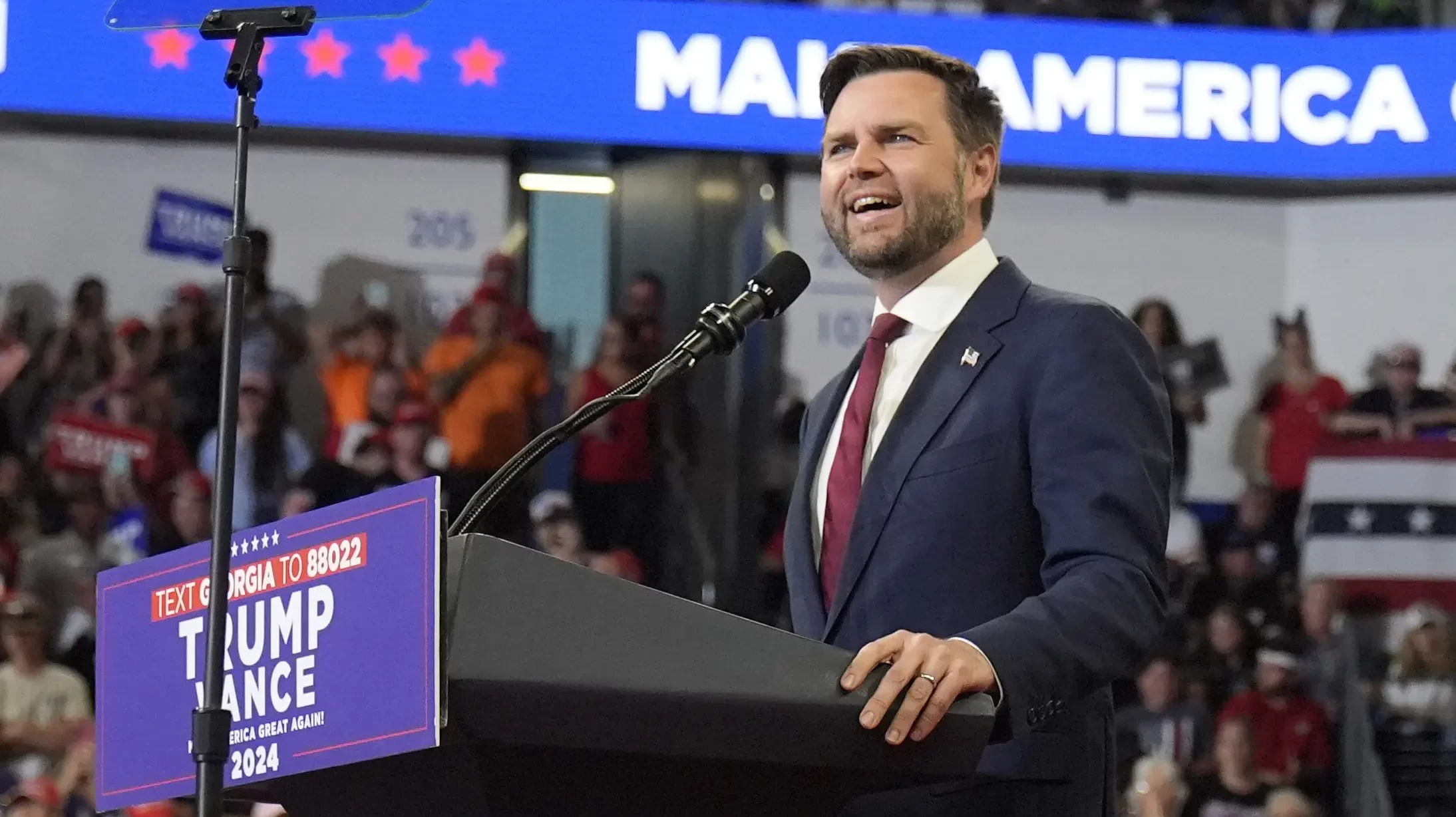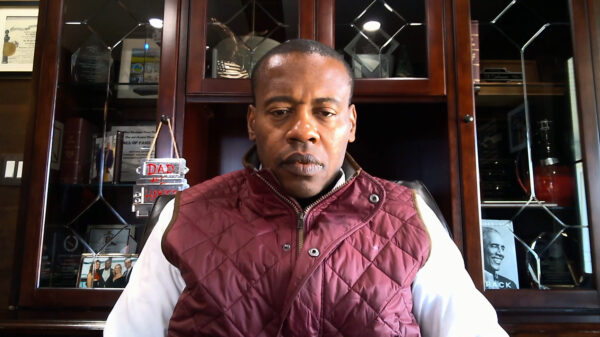|
Getting your Trinity Audio player ready...
|
The junior U.S. senator from Ohio — the man who could be the next vice president of these United States — does not have carnal knowledge of loveseats, davenports or sectionals.
Probably.
What started in July as a crass online joke (specifically that Sen. J.D. Vance included in his memoir “Hillbilly Elegy” a story about a youthful indiscretion involving a glove and a couch) eventually became so popular that opposing veep nominee Tim Walz referenced it in his Aug. 6 introduction as Kamala Harris’ running mate. Walz drew a laugh from the crowd for his willingness to work blue but drew consternation from CNN’s Jake Tapper and what the anchor called a “gross smear.”
But is it really a smear?
That’s likely a mischaracterization since few people consider the couch joke as anything but a ribald swing at a pompous, aloof weirdo, a jab at both the man and his ballyhooed, self-aggrandizing origin story. For something to truly be a “smear” — at least in a legal, defamatory sense — it has to attack a person’s reputation, and it has to stick, and as courts all across America have held when it comes to defamation law, if a statement cannot truly be taken as an expression of a literal fact — either in context or on its face — then it cannot be defamatory. Thus, as a matter of civil law (despite its incivility), we are free to say that Vance has had any number of romantic trysts with furniture, so long as a reasonable person would not believe it to be a factual allegation and instead would understand it as a satirical political commentary.
And while the Supreme Court has clearly established that point — that rough, even mean-spirited and/or disgusting non-literal political speech is protected — and lower courts have applied it in a variety of circumstances, as we get into the headiest part of the most online election of our lifetimes, it’s worth remembering that all speech free principles (including this one) have limits.
Beginning in 1970 and continuing for another two decades, the Supreme Court expanded on its landmark New York Times v. Sullivan decision to clarify and expand protections for opinion, rhetorical hyperbole and similar expression that does not state a provable fact. First, with Greenbelt Cooperative Publication Association v. Bresler, the Court overturned a libel judgment against a Maryland newspaper that published articles referring to a developer’s negotiating tactics as “blackmail,” with Justice Potter Stewart writing “even the most careless reader must have perceived that the word was no more than rhetorical hyperbole” rather than a criminal accusation. In 1974’s Old Dominion Branch No. 496 v. Austin, the Court reversed a Virginia decision that found a labor union newsletter liable for defamation after it printed a list of “scabs” and “traitors,” holding instead that the labor union had “license to use intemperate, abusive or insulting language without fear of restraint or penalty if it believes such rhetoric to be an effective means to make its point.”
Perhaps the most central Supreme Court case to answering the question of whether Twitter users can be mean to J.D. Vance came in 1988 with the Court’s decision in Hustler v. Falwell. In that case, one brought by the Rev. Jerry Falwell after Hustler printed a parody liquor ad detailing the religious leader’s supposed drinking and imagined fornication with his own mother in an outhouse, the Court made it clear that Falwell and other people in the public eye can’t recover damages for mean-spirited and emotionally harmful — but clearly not factual — statements. “[I]n the world of debate about public affairs,” the Court concluded, “many things done with motives that are less than admirable are protected by the First Amendment.”
And, finally, in 1990’s Milkovich v. Lorain Journal Co., while the Court found that a newspaper column pointedly accusing a coach of perjury by way of factual allegation was not protected by those previous decisions, the Court neatly summarized them: “[T]he Bresler-Letter Carriers-Falwell line of cases provides protection for statements that cannot reasonably be interpreted as stating actual facts about an individual. This provides assurance that public debate will not suffer for lack of imaginative expression or the rhetorical hyperbole which has traditionally added much to the discourse of our nation.”
Lower courts have applied these principles in diverse settings such as newspaper editorial pages, magazines (both adult and not so unsavory), an “edgy” ESPN alternative brand, the theatrical stage, fake social media profiles and more to protect speech that was insulting but failed to objectively state a fact.
In National Rifle Association v. Dayton Newspapers, a Dayton Daily News editorial suggesting the NRA “happily encourages” violent crime because it opposes gun control measures was found to be constitutionally protected speech. Likewise, in Garvelink v. Detroit News, a column with a faux interview satirical on its face was found to be protected in part because it appeared on the editorial page, a place where “a reader is prepared for exaggerations, mischaracterizations and biases of the writer.”
Graphic and degrading sexual fantasies in Hustler and Penthouse magazines that mentioned specific female public figures were found not to be defamatory, as was Boston Magazine’s suggestion that a local broadcaster was “enrolled in a course for remedial speaking.” Motorcycle daredevil Evil Knievel similarly had a defamation lawsuit against ESPN dismissed as he failed to recover damages against the broadcaster for using the word “pimp” in a caption of a picture of him with two women on its eXpn.com website. In Khdorkovskaya v. Gay, the dismissal of a Russian plutocrat’s wife’s defamation suit against a playwright was upheld where the play in question contained fantastical elements such as Vladimir Putin’s Siberian tiger companion, a ghost and the Putin character’s frequent retreat to absurdist poetry. Finally, in O’Donnell v. Knott, a federal trial court found that a Pennsylvania woman established a case for constitutionally prohibited retaliation after police detectives questioned her regarding a social media profile that parodied their chief’s daughter by pointing out a recent arrest and calling her a “tramp.”
These lower court decisions, together with Supreme Court precedent, make it clear that offensive or otherwise irksome needling is protected free speech so long as it does not make a factual statement or otherwise stray into illegality — and there are a handful of decisions that should give the “so long as” considerable pause for electoral tricksters or others claiming parody as a defense.
In AmerisourceBergen Corp. v. Doe, a Pennsylvania appeals court declined to prevent a trial court from unmasking commenters on a business news website after they appropriated the identity of an executive and disclosed what appeared to be sensitive information. “The comments in question do not constitute obvious satire,” the court concluded, “and were not such that a reasonable reader could be expected to recognize that [the plaintiff]’s name was used ironically or as part of protected commentary on an issue of public importance.
In Flamm v. American Association of University Women, the U.S. Court of Appeals for the Second Circuit reversed the dismissal of a defamation lawsuit against a non-profit organization that offered a referral service for lawyers and maintained a directory, with the latter including a single negative entry that referred to the plaintiff as an “ambulance chaser” only interested in “slam dunk cases.” In concluding that the statement reasonably implied that the plaintiff had engaged in “unethical solicitation,” the court observed that “[a] reader of the directory, seeing the only negative comment among several hundred entries, would likely turn elsewhere for assistance” because a reasonable person does not expect the hyperbole common to political disputes in “a straightforward directory of attorneys and other professionals.”
And finally, in a case that could upend this particular corner of legal doctrine, in U.S. v. Mackey, a federal trial court declined to find a First Amendment issue with a criminal indictment of a Twitter user charged with conspiracy following his creation and dissemination of a meme suggesting that Hillary Clinton supporters could vote via text in the 2016 presidential election. In its decision refusing to throw out the government’s indictment, the court separated defendant Douglass Mackey’s tweets and patently ridiculous Twitter persona (fictional baseball hurler Ricky Vaughn from the “Major League” films) from his active efforts to suppress votes even as that effort was based on the platform. “Defendant Mackey’s deceptive tweets are most accurately characterized as a vehicle or means for illegal conduct, and that the statute—even as applied—is targeting that aspect of Mr. Mackey’s behavior, rather than a free-floating crime of speech,” the court wrote. “Treason is still treason if it is spoken aloud. Conspiracy is still criminal if it is communicated verbally.”
Mackey was convicted and subsequently sentenced to seven months in prison. Yet he remains free pending a Second Circuit decision in his appeal. Conceptually, his case is somewhat difficult; if we hold to the abiding principle from these cases — that unbelievable and/or satirical speech is protected — then no one should ever be held criminally responsible for a meme purporting to offer the opportunity to vote with a text message in a presidential election. But Mackey is no innocent comedian, as the government was able to introduce evidence suggesting his goal was not to amuse, but to suppress votes. Is his illegal intent enough to send him to the federal penitentiary? Or should he get a pass for functional incompetence in order to protect more of our political speech?
That’s a matter for the Second Circuit to sort out. In the meantime, the best pushback for political speech we find offensive or otherwise inappropriate, the best answer for a joke or a meme in a heated election campaign that crosses some ill-defined line is to express our displeasure.
And when that expression of disapproval translates into votes, that’ll be enough to reshape the discourse of any political campaign.
At least any campaign that hopes to win.





















































